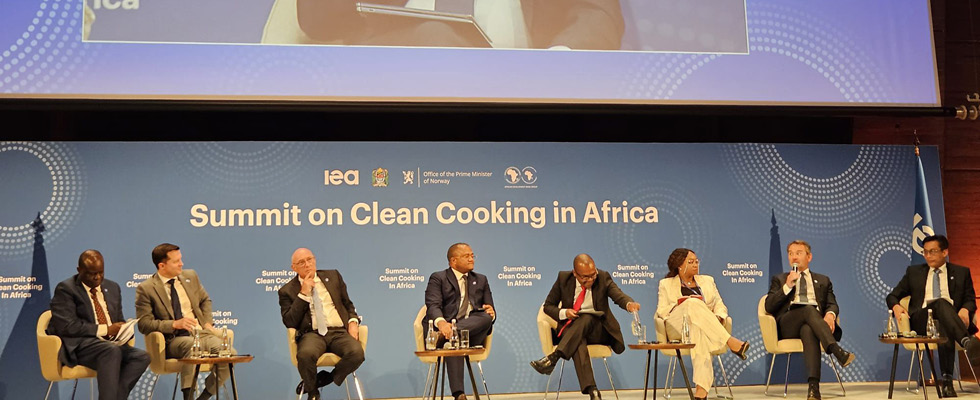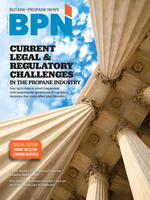
This year saw an unprecedented major event for liquefied petroleum gas (LPG) for clean cooking, and the World Liquid Gas Association (WLGA) was able to take a key role. For background, every year the indoor air pollution caused by smoke from open fires and traditional stoves kills about 4 million people. Every eight seconds, someone — mostly women and children — dies as a consequence of the inefficient use of biomass fuel for cooking. Cooking is the oldest form of energy use, and stovetop cooking is one of the most energy-consuming activities.
For some 2 billion people living in low-income countries — mostly in the Global South — the simple daily act of cooking is a major health and safety risk. People in these regions routinely cook with fuels such as wood, animal dung and kerosene. Burning these types of fuels in open fires or traditional stoves causes harmful household air pollution, resulting in an estimated 3.2 million deaths annually, according to the World Health Organization, and contributes to various health, socioeconomic and environmental issues.
Health effects are mostly concentrated among women, who are more likely to be responsible for cooking. The work of gathering fuel exposes women and children to safety risks and constrains their time which otherwise could be available for education, rest and even paid work. LPG is an immediate solution to this issue and plays a key goal in the UN Sustainable Development Goals, particularly Goal 7: “access to affordable and clean energy.” Many governments are already prioritizing the rapid scale-up of LPG to secure cleaner cooking and forest protection.
To this end, the International Energy Agency (IEA) and Clean Cooking Alliance organized a major Summit on Clean Cooking in Africa, which took place at UNESCO headquarters in Paris this May. It was co-chaired by the president of the United Republic of Tanzania, H.E. Samia Suluhu Hassan; the prime minister of Norway, H.E. Jonas Gahr Støre; the president of the African Development Bank Group, Dr. Akinwumi A. Adesina; and the executive director of the IEA, Dr. Fatih Birol. The Summit was the largest-ever clean cooking event, welcoming an impressive 1,000 delegates, four heads of state, 23 ministers and 55 government delegations. Summit attendees also included high-level representatives from industry, development partners, international organizations, philanthropies and civil society, making it the largest-ever gathering dedicated to the shared objective of advancing clean cooking access in Africa.
The hosts pledged to make clean cooking a priority and enhance efforts toward achieving universal access for all, recognizing its essential role in achieving Sustainable Development Goal 7. Universal clean cooking access was underlined once more by African leaders as a priority issue for collective action for African governments and the international community on climate.
The result was that $2.2 billion was pledged to clean cooking projects in Africa, where four in five people still cook with biomass, wood and kerosene. Nine African governments have publicly committed to making access to clean cooking a national priority and are taking necessary steps to implement proven policy measures in their countries to usher greater progress. More than 130 delegations endorsed The Clean Cooking Declaration, including 28 governments, as well as many international organizations — including, of course, WLGA. The declaration is a clear demonstration of a shared commitment and resolve to collective action and progressing this important agenda through various forums until this issue is finally solved.
At the summit, the president of Togo, Faure Gnassingbé, said LPG would fit the bill as the “way forward” for clean cooking and that Africa would need an increase in production capacity. In addition, Gnassingbé stated there would need to be adjustments to environmental criteria by ESG investors in order to support LPG in cooking projects, despite its fossil fuel classification.
WLGA had a seat at this discussion table. WLGA CEO James Rockall spoke at the event, and WLGA was nominated to lead the LPG delegation.
Aligned with these efforts, WLGA has now set up a Cooking for Life Africa Task Force (CFLA), which will be a platform for industry participation. This task force is open to WLGA Industry Council members and will create an Africa LPG Roadmap. Important milestone events are the COP29 negotiations in Baku, Azerbaijan, and, of course, LPG Week in November in Cape Town. The deliverables are a comprehensive communications campaign, media engagement and most importantly the Africa LPG Roadmap. This road map will quantify the potential for LPG adoption and provide recommendations for regulators and NGOs to develop an investment environment that unlocks this significant potential. The first phase of the road map is planned to be ready for COP29 this November.
As a clean burning, exceptional energy, LPG will have an essential role in advancing clean cooking globally, and the WLGA is proud to be driving this global shift.
As WLGA’s Rockall said, “Universal access to clean cooking means greater gender equality, healthier living conditions and more economic opportunities for communities across Africa. However, achieving this goal requires investment, regulatory support and collective action across the public and private sector. [The summit] marked an important milestone in helping protect some of the most vulnerable communities in the world. However, make no mistake — we still have lots of work to do.”
Learn More
Click here for more information on the Clean Cooking Declaration.
The key outcomes have been captured in the Chairs’ Summary of the Summit.
Additionally, there is a detailed outcome document and action plan, which includes each announcement made at the Summit.
You can also learn more about WLGA’s key focus areas in clean cooking by clicking here.


